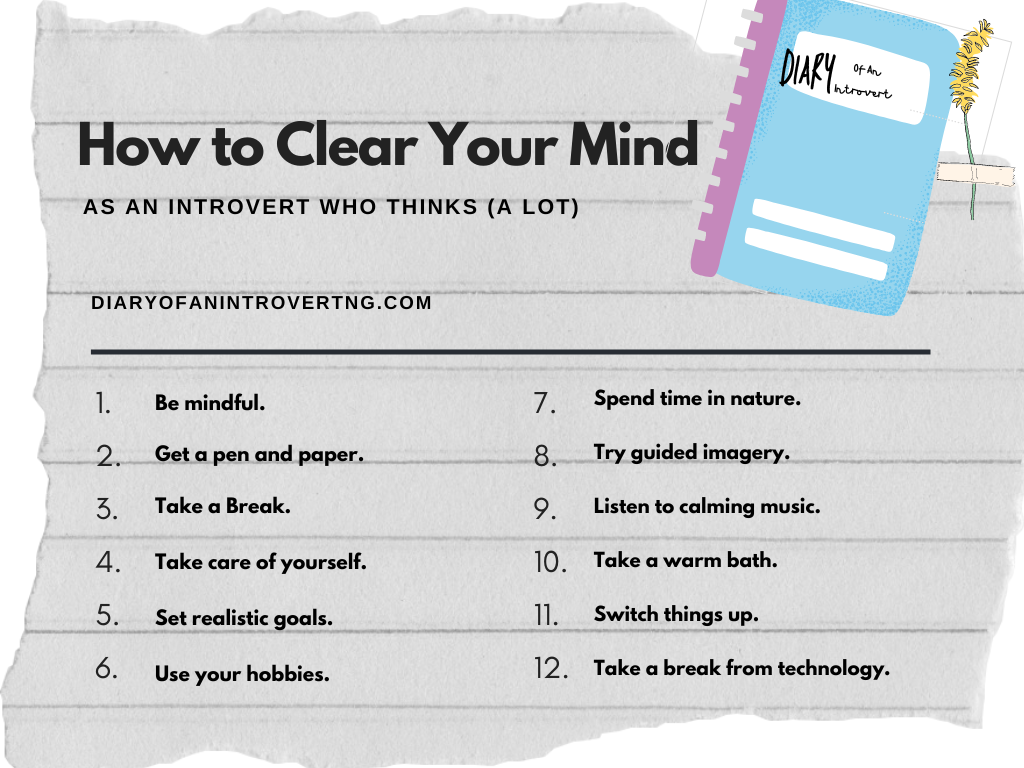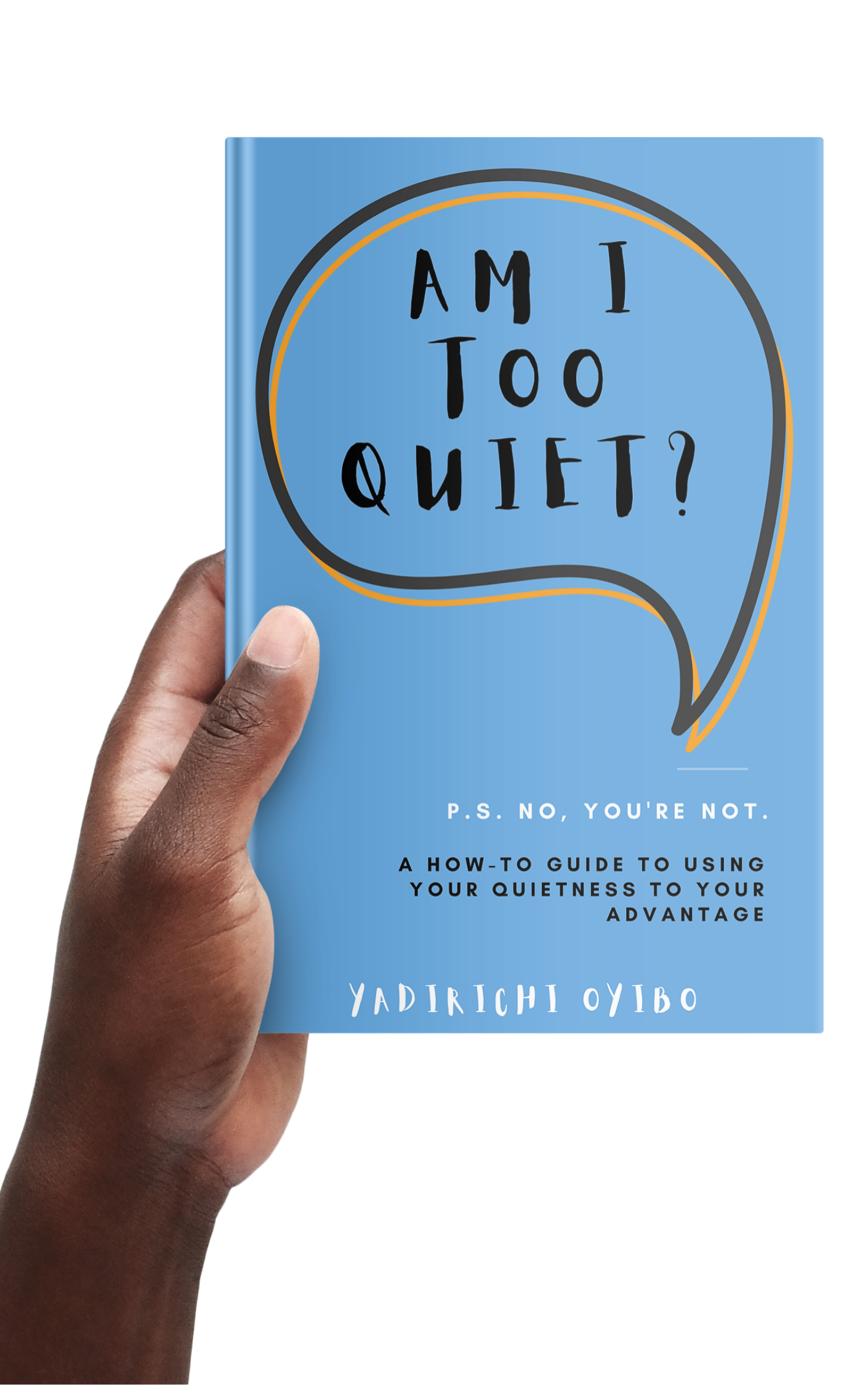How to Clear Your Mind As an Introvert Who Thinks (A Lot!)
Photo by Nathan Dumlao on Unsplash
Your mind is a constant source of activity.
You have an active imagination and love to think deeply about things.
It’s clear you’re an introvert. While this can be a great strength, it can also lead to feelings of overwhelm, anxiety, and mental exhaustion.
All introverts aren’t the same. For example, some might be social introverts who enjoy some social situations more than the average introvert.
Then, there are thinking introverts who spend more time in their thoughts than most quiet people. If you’re in this category, then this article is for you.
Thinking introverts are known for deep, reflective thinking. We ruminate over the smallest details (a lot) and have a tendency to spiral into overthinking and analysis paralysis.
A clear mind is something we ‘thinking introverts’ need the most. Learning how to clear your mind of unwanted thoughts is a superpower that’ll help us to stay on top of our game.
When I can’t clear my mind, it cripples my productivity to the barest minimum. I get stuck in one activity for too long because I can’t get my mind to focus on the task at hand.
More so, I’m immersed in abstract worlds to the point where it becomes difficult to connect with my surroundings. So, finding how to clear my mind and offload my thoughts is essential for me.
Here are some reasons why introverts may think a lot.
Inner Focus.
Introverts tend to focus more on their internal thoughts and feelings than external stimuli. There’s more inward activity in us than in people with other personality types.
That’s why it can be hard for quiet thinkers to pay attention to what’s happening externally.
So, when you think, “Why do introverts think a lot?” Know that our minds are preoccupied with our thoughts and emotions, and we’re constantly analyzing our experiences.
For example, if I have an eventful day, my mind is prone to replay those events to seek clarity on matters. This process can lead to a lot of introspection and self-reflection, which can be both positive and negative.
If my mind is too active and I need to rest, it can lead to inner turmoil. Knowing how to be clear-minded is essential because clearing your mind brings inner peace.
Processing Information.
Introverts may take longer to process information than extroverts because of how our brains are wired.
We prefer to take our time to carefully think through things before making a decision or taking action.
According to research, our brains take a longer pathway to transmit information, which is why we may be quieter in many situations versus more social people.
For example, if you ask an introvert how to get something done, they'll naturally think of the best possible method, which will take more time. Their minds are more thorough, and they’d prefer not to leave any important detail out.
This can lead to much consideration before taking action, which can be both a strength and a weakness. In several cases, it’s vital to be clear in mind if overthinking is inhibiting productivity.
Creativity.
Introverts often have a rich inner world that fuels their creativity. They enjoy exploring their own imaginations and coming up with new ideas.
This process makes us have a lot of mental activity. Most of my creative thinking happens when I can silence the external world and focus within.
Even better, thinking a lot helps me draw inspiration from the littlest things. I can get ideas from the things I hear, see, and smell - basically using all my five senses to be inventive
This trait is a superpower, but sometimes intrusive thoughts can prevent me from making any progress. So, mind clearing is a vital ability that introverts need to learn and imbibe.
Sensitivity.
Introverts are highly sensitive to their environment and the people around them. They may spend a lot of time processing their reactions to the world around them.
According to research, 70 percent of highly sensitive people (HSP) are introverts. This explains why we engage in a lot of deep thinking about our own emotions and the emotions of others.
My surroundings tend to have a lot of impact on my emotions. Therefore, clearing my head when I’m overstimulated is necessary. This process will prevent me from breaking down.
For sensitive people, we need to clear the mind to feel lighter and more at ease with ourselves and our surroundings.
Personality Traits
Introverts are often more introspective and analytical than extroverts. We may be more prone to deep thinking and reflection as a result of our personality traits.
This means that being an introvert naturally makes me a deep thinker.
I need to understand my own thought processes and take steps to manage my high level of mental activity.
We introverts can harness the power of our deep thinking in our inner world by doing this.
This process begins with knowing how to clear your head as a quiet person who's overthinking.
Related: Am I Too Quiet? P.S. No, You’re Not. A How-To Guide to Using Your Introversion to Your Advantage
12 Things To Do To Clear Your Mind When Nothing’s Working.
It's important to learn how to clear your mind and find balance so you can feel more focused and productive.
In this section, we'll explore some tips for introverts who think a lot and struggle to clear their minds.
I’ve cleared my head with most of these methods, so these are tested to work for you.
Be mindful.
In simple terms, mindfulness is like meditation.
It’s being fully present in the moment and aware of your thoughts and feelings.
After too much daydreaming and rumination, mindfulness helps you focus your attention away from the negatives and positively connect with your surroundings.
It’s how to clear your mind from stress and anxiety.
As an introvert who thinks a lot, I’m easily caught up in my own thoughts and I lose touch with what's happening around me.
I have learned to observe my thoughts without judgment and bring my focus back to the present moment with mindfulness.
It’s a simple practice that you can achieve from where you’re seated right now.
These are some of the ways to clear your mind with this practice:
Pay attention to your breathing
Slow down your thoughts
Allow yourself to experience things much slower
Imagine yourself feeling lighter and focusing on positive thoughts
If necessary, take a mindful walk to offload intrusive thoughts and focus on the experience of walking itself.
2. Get a pen and paper.
Writing down your thoughts is a great way to clear your mind and organize your ideas.
As an introvert, you may find it easier to express yourself through writing than speaking.
I’ve done it, and it works.
Have you ever felt like an idea was constantly lingering in your mind? Did you keep thinking about it, like you were afraid you’d forget it? That’s a sign that you need to offload your thoughts.
Knowing how to clear your mind quickly in such a situation will help you stay productive.
Keep a journal or notepad handy and jot down any thoughts that are weighing on your mind. This can help you process your thoughts and make sense of your emotions.
Personally, I can’t move forward with other activities if one thought is still lingering and demanding my attention. The moment I write them down, I feel at ease.
I recommend getting these gorgeous introvert journals if you’re wondering how to clear your head as quickly as possible.
3. Take a Break.
Sometimes, the best way to clear your mind is to step away from the task at hand.
As an introvert, you may find it draining to be in social situations or to be constantly engaged in mental activities.
Take a break and do something that allows you to relax and recharge, such as taking a walk in nature, watching a movie, or reading a book.
This list of things introverts love can help you know how to clear your thoughts as a quiet person.
I personally enjoy watching movies, and it’s the fastest medium for clearing my mind. Even during college work, I imbibe the habit of taking regular breaks when studying to catch up with some Netflix series.
Ironically, I may not enjoy reading books when my mind is full, but this hack tends to work for other introverts.
Therefore, picking preferences will help you know how clear your mind can be when you’re overstimulated.
4. Take care of yourself.
As an introvert who thinks a lot, it's important to prioritize self-care to avoid burnout.
This can include getting enough sleep, eating a healthy diet, and engaging in activities that bring you joy.
When your mind is cluttered, it's easy to become overwhelmed and lose sight of your priorities. By taking care of your physical and emotional needs, you can reduce stress and find more mental clarity.
Reading articles can help declutter my thoughts if I’m feeling emotionally drained.
If you don’t readily have someone to talk to (like me), this method is how to clear your mind of thoughts.
At times, when your body is craving something, it can result in mental overload. For example, as a freelance writer, I often write while lying in bed.
This unfortunately isn’t a great posture for writing, which can result in back pain and inevitably affect how well I write.
So if I’m wondering how to clear my head, I can focus on making my body feel more comfortable, and then my thoughts can flow better.
Liking this article? Join our Introvert Club→
5. Set realistic goals.
We introverts often have high expectations for ourselves and feel pressured to achieve a lot in a short amount of time.
However, this can lead to feelings of overwhelm and mental exhaustion.
For example, I prefer to write blog posts for Diary of an Introvert myself because it is, in fact, the major idea for my website.
However, common blogging practice suggests releasing new blog posts a couple of times a week. But due to my principles, it can be hard to keep up with that.
So in my case, I have to choose quality over quantity as a goal I can achieve. Knowing that my plans are within reach is how to have a clearer mind to operate optimally.
Set realistic goals for yourself and break them down into smaller, manageable tasks. This can help you stay focused and avoid feeling overwhelmed.
It’s also necessary to know how to clear your mindset of unnecessary pressure. Getting one thing done correctly is more valuable than completing a slew of sloppy tasks.
Related: Working With Introverts? 7 Interesting Things to Keep in Mind
6. Use your hobbies.
Find a hobby that allows you to express yourself creatively.
Hobbies are a great way to unwind for any thinking introvert. You should get creative with your hobbies in these two ways:
Get a hobby that allows you to focus on the present moment and forget about your worries like painting, knitting, or gardening.
Another way is to choose a hobby that challenges you and requires your full attention, such as playing an instrument or learning a new language. This can help you shift your focus away from overthinking and onto something more productive.
Whatever hobby you choose, make sure it brings you joy and allows you to take a break from your thoughts.
Clearing the mind should be a pleasurable experience rather than a chore. Pay attention to what you naturally love doing or what you’ve always wished to do.
7. Spend time in nature.
Spending time in nature can be a great way to relax and recharge.
Amazingly, all these activities have been proven to reduce overthinking and rumination. For example, being in nature reduces the stress hormone cortisol, which calms an overactive mind.
According to research, freeing your mind in a natural environment improves your focus and attention. Spending time in nature also boosts your mood and diminishes the negative thought patterns that accompany overthinking.
Nature also expands your creativity and inspiration. When I want to write, I find the best inspiration when I’m around clear skies and green trees.
Whether you're going for a hike, spending time at the beach, or simply sitting outside to enjoy the sunshine, know that you’re naturally alleviating overthinking.
Overall, spending time in nature provides a much-needed break from the overstimulation of modern life and helps reset an overactive mind.
8. Try guided imagery.
Reading a book is a great way to escape into another world and give your mind a break.
You can also use guided imagery to reach the peak of mental satisfaction.
Guided imagery means using your imagination to create a peaceful and calming mental image. It’s one of the best ways to clear your mind.
Here’s how to clear your mind and stop thinking with this technique:
Find a quiet and comfortable place where you won't be disturbed.
Close your eyes and take a few deep breaths to relax your body and mind.
Begin to imagine a peaceful and calming scene, such as a beach, forest, or mountains.
Use your senses to make the image as vivid and real as possible. (For example, imagine feeling the warmth of the sun on your skin, the sand between your toes, or the sound of the waves crashing on the shore.)
Focus on your breathing and try to sync it with the image. (For example, imagine the waves coming in and out with your breath.)
Stay in this relaxed and peaceful state for as long as you like.
When you're ready to return to your day, take a few deep breaths and slowly open your eyes.
9. Listen to calming music.
Choose music that makes you feel calm and peaceful. This is how to clear your mind to focus.
Whether it’s classical music, ambient music, or even nature sounds, experiment with different genres and see what works best for you.
Sometimes, when I'm trying to focus, I use white noise to silence external noise.
You can also clear your mind with breathing techniques. Take deep breaths with the rhythm of the music, or even better, let the music guide your imagination and take you on a journey.
Use the music to create a mental image of a peaceful and calming scene.
The more you engage in this activity, the more you’ll make your space quiet and comfortable. So, dim the lights, light some candles, and listen to your favorite songs.
10. Take a warm bath
Bathing relaxes your muscles and allows you to have a clear mindset. Add some essential oils or Epsom salts for added relaxation.
Warm baths activate the body's relaxation response, which helps to reduce stress and anxiety. It’s how to clear your head from stress.
When you're immersed in warm water, your muscles relax, your breathing slows down, and your heart rate decreases. Warm water is also good at regulating your body temperature. When your body is at a comfortable temperature, it's easier to clear your thoughts.
This process also triggers the release of endorphins, which are the body's natural painkillers and mood boosters. Your blood vessels dilate, blood flows to your muscles and organs, and tension in your muscles eases out, promoting relaxation.
When your body is relaxed and your mind is clear, it's easier to fall asleep and stay asleep throughout the night.
11. Switch things up.
Dance, rearrange your room, or find an activity that you enjoy, such as walking, swimming, or cycling. This is how to clear your mind instantly and release tension.
Moving your body improves your mental health and is also a powerful tool to stop overthinking. When you're dancing, you're fully engaged in the present moment and not focused on your thoughts.
You’ll have clear thoughts and shift your focus to your body and the music.
By rearranging your room, you can create a more peaceful and organized environment.
To declutter your space, start by identifying the areas that need the most attention. Then, go through each item and decide whether to keep, donate, or discard it. Do this regularly to keep things organized.
Lastly, switch up your schedule with something you wouldn’t have otherwise planned. It’s a great way to break free from your clouded thoughts. More so, you’ll feel at ease with yourself when you’re done.
12. Take a break from technology.
Spending time with friends and family can be a great way to take your mind off things and enjoy close interaction.
Give your mind a break and reduce stress by unplugging from technology. Take a digital detox for a day or two and see how you feel.
If you’re wondering how to clear your mind permanently, start by:
Setting clear boundaries for your technology use. For example, the number of times you’ll check your email or social media accounts in a day.
Turning off notifications, and avoiding screens before bedtime.
Finding alternative activities to fill the void, such as reading, exercising, or spending time outdoors.
Enlisting the support of friends or family members to help you stick to your digital detox plan.
Being patient and kind to yourself as you adjust to a less connected lifestyle.
Final Thoughts
As an introvert who thinks a lot, it's important to learn how to clear your mind and find balance. By practicing mindfulness, writing down your thoughts, taking breaks, and the many other steps listed above, you can reduce stress and find more mental clarity. Remember to be kind to yourself and take the time you need to recharge and reset. How do you clear your mind? Share below.
Live Your Best Quiet Life
Get the Am I Too Quiet? book →














